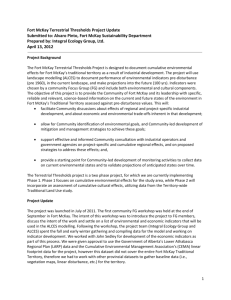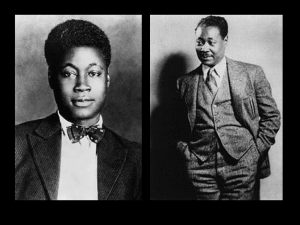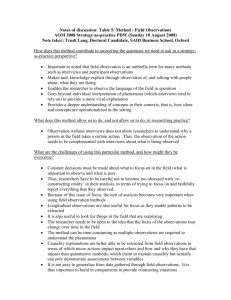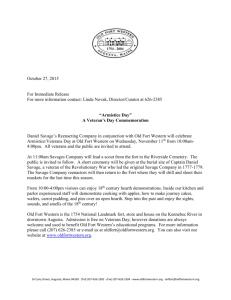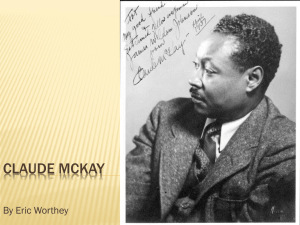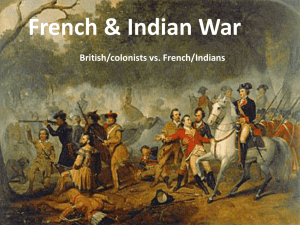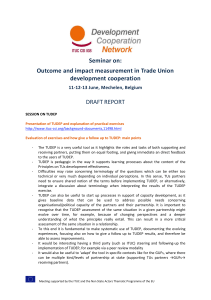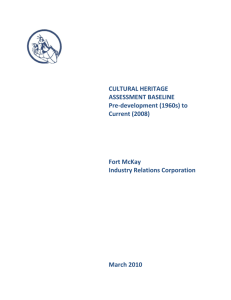TTW TUS Project Update April 2012
advertisement
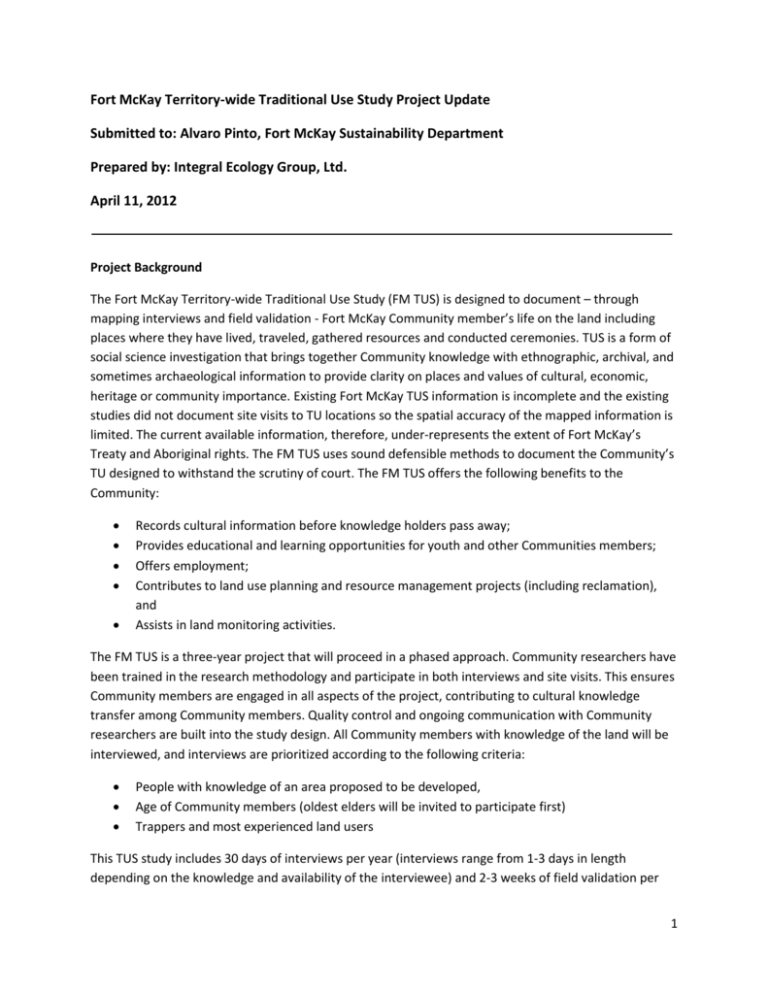
Fort McKay Territory-wide Traditional Use Study Project Update Submitted to: Alvaro Pinto, Fort McKay Sustainability Department Prepared by: Integral Ecology Group, Ltd. April 11, 2012 Project Background The Fort McKay Territory-wide Traditional Use Study (FM TUS) is designed to document – through mapping interviews and field validation - Fort McKay Community member’s life on the land including places where they have lived, traveled, gathered resources and conducted ceremonies. TUS is a form of social science investigation that brings together Community knowledge with ethnographic, archival, and sometimes archaeological information to provide clarity on places and values of cultural, economic, heritage or community importance. Existing Fort McKay TUS information is incomplete and the existing studies did not document site visits to TU locations so the spatial accuracy of the mapped information is limited. The current available information, therefore, under-represents the extent of Fort McKay’s Treaty and Aboriginal rights. The FM TUS uses sound defensible methods to document the Community’s TU designed to withstand the scrutiny of court. The FM TUS offers the following benefits to the Community: Records cultural information before knowledge holders pass away; Provides educational and learning opportunities for youth and other Communities members; Offers employment; Contributes to land use planning and resource management projects (including reclamation), and Assists in land monitoring activities. The FM TUS is a three-year project that will proceed in a phased approach. Community researchers have been trained in the research methodology and participate in both interviews and site visits. This ensures Community members are engaged in all aspects of the project, contributing to cultural knowledge transfer among Community members. Quality control and ongoing communication with Community researchers are built into the study design. All Community members with knowledge of the land will be interviewed, and interviews are prioritized according to the following criteria: People with knowledge of an area proposed to be developed, Age of Community members (oldest elders will be invited to participate first) Trappers and most experienced land users This TUS study includes 30 days of interviews per year (interviews range from 1-3 days in length depending on the knowledge and availability of the interviewee) and 2-3 weeks of field validation per 1 year. In addition, all TUS interviews are be video recorded and fully transcribed. Information gathered during the FM TUS is be archived in Community Information System (CIS) to ensure the information is safeguarded and accessible to Fort McKay First Nation and Metis staff. Outcomes from this project link with and help inform the Terrestrial Thresholds Project. Project Update The project was launched in July of 2011. Since that time, more than 20 days of interviews with 15 people have been conducted on a somewhat monthly basis. Our initial interview focus was people with knowledge of the Moose and Buffalo Lake area due to the proposed development adjacent to Fort McKay I.R. 174A and 174B by Dover OPCO. We conducted interviews with people of both Dene and Cree ancestry who lived in or used the area. We then prioritized interviews with elders with health concerns to ensure they were given an opportunity to share their knowledge. Our next set of interviews will focus on people with knowledge of currently proposed development areas, including: Suncor Voyageur South Mine, Shell Pierre River Mine, Total E&P Northern Lights and Shell Jackpine Mine Expansion (note: we have already conducted interviews for the Teck Frontier Mine area). In February 2011, we conducted a four-day TUS methods training course for two community researchers hired by the Fort McKay Sustainability Department (FMSD), Jean L’Hommecourt and Clinton Boucher. The community researchers are mentored by Integral Ecology Group to manage and input data into Fort McKay’s Community Information System (CIS), participate in TUS interviews, and video document the FM TUS project. Community researchers have daily communication with Integral Ecology Group staff to ensure that they are receiving the guidance and support needed to carry out their work. At least one member of the Integral Ecology Group will continue to participate in all interviews and fieldwork until FMSD staff and researchers are comfortable with the interview and data management process. Interviews are being transcribed and all data is archived in the CIS. We are currently using Google Earth to perform interview mapping which allows for immediate entry into the Fort McKay CIS. We will be commencing with field validation of TU sites this summer and fall. We are in the process of scheduling the site visits for 2012 and anticipate the following priorities: 1) a visit with James Grandjambe’s to his trapline cabin (he and Arthur Boucher are the oldest members of the Fort McKay community) 2) obtaining GPS coordinates for all/most of Fort McKay trapline cabins 3) ground-truthing gravesites within Fort McKay’s Traditional Territory. The project continues to operate on schedule. The project timeline was extended from two years to three years at the request of FMDS staff, and the currently scheduled project completion date in July 2014. 2
